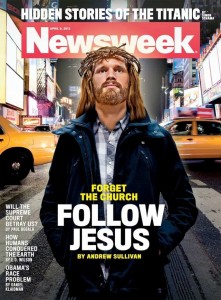 I think, maybe, just maybe, I had my first seminary dream about General Seminary last night. I’m not sure how the dream started and I don’t think my seminary was the point of the dream at all but, there it was, hanging out. However, GTS wasn’t located where it usually is in Chelsea; nor was the entire campus there. Rather, the front of the chapel was located in my neighborhood of Washington Heights. And, not only that, it was not really a chapel anymore. It had become one of those storefronts where the merchandise spills out into the street and the entire front is covered in clothes hanging from hangers. And the front was entirely black because it was covered in cassocks. They had cassocks of all sizes! Small, large, child-size, etc. I think there was even a cassock spanx option and, I kid you not, they even had those half mannequins, the ones that are just legs but have some extra room in the back (if you know what I mean) to model jeans, with cassocks on them. Cars, taxies, traffic, and people were wizzing by as I stopped to take a look. My friend Anne came out to talk to me, and several of my friends were moving cassocks from one spot to another. I don’t think they were actually trying to sell anything – they were just moving things up, down, left, right, and using that giant hook to reach the top hangers. And the chapel even had its own awning with pigeons walking along it.
I think, maybe, just maybe, I had my first seminary dream about General Seminary last night. I’m not sure how the dream started and I don’t think my seminary was the point of the dream at all but, there it was, hanging out. However, GTS wasn’t located where it usually is in Chelsea; nor was the entire campus there. Rather, the front of the chapel was located in my neighborhood of Washington Heights. And, not only that, it was not really a chapel anymore. It had become one of those storefronts where the merchandise spills out into the street and the entire front is covered in clothes hanging from hangers. And the front was entirely black because it was covered in cassocks. They had cassocks of all sizes! Small, large, child-size, etc. I think there was even a cassock spanx option and, I kid you not, they even had those half mannequins, the ones that are just legs but have some extra room in the back (if you know what I mean) to model jeans, with cassocks on them. Cars, taxies, traffic, and people were wizzing by as I stopped to take a look. My friend Anne came out to talk to me, and several of my friends were moving cassocks from one spot to another. I don’t think they were actually trying to sell anything – they were just moving things up, down, left, right, and using that giant hook to reach the top hangers. And the chapel even had its own awning with pigeons walking along it.
The Chapel of the Good Shepherd as a literal storefront church – that would be pretty wild. I don’t think of mainline protestant churches as storefronts. Even the storefront churches in my neighborhood are being closed down and transformed back into restaurants, stores, and condos. The very idea of a “storefront church” seems rather foreign in a neighborhood that is being gentrified. But it would be wild to take the seminary’s chapel, a chapel that is designed to perform the daily office, and that is locked inside the fortress walls of General Seminary, and put it right out there, on the street, so that anyone could access it. It seems that every week, as I leave seminary, someone on the street and speaks to me that they didn’t know a church was there until they heard the chimes. People don’t really look up, they don’t see signs labeling the building or the entrances; something needs to catch their eye or their ears and intrude into their iPod/iPhone earbud shielded worlds. I wonder if a storefront full of black cassocks, on a Good Friday, when the sky is darkened as Jesus’ breathed his last on the cross – I wonder if all that pious black, would somehow crack into a random passerby’s world, just for a moment, or if, being New Yorkers, we’d need a little more – like some chimes, a loud cry, or maybe a Mr. Softie Ice Cream truck – church style. Hmmm. I don’t know. But a Mr. Softie Ice Cream truck playing A Mighty Fortress is My God might get noticed.




